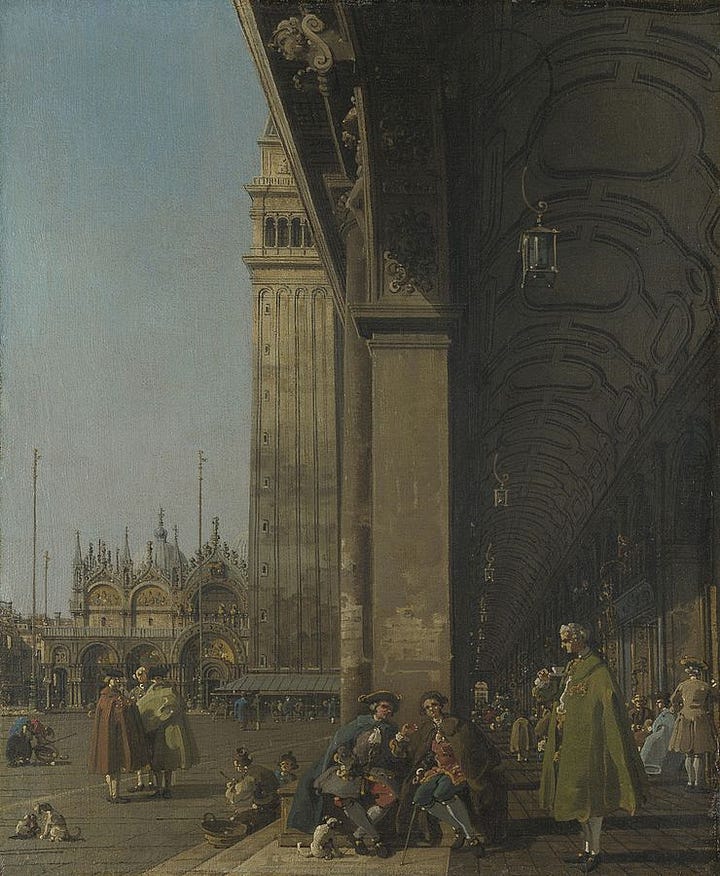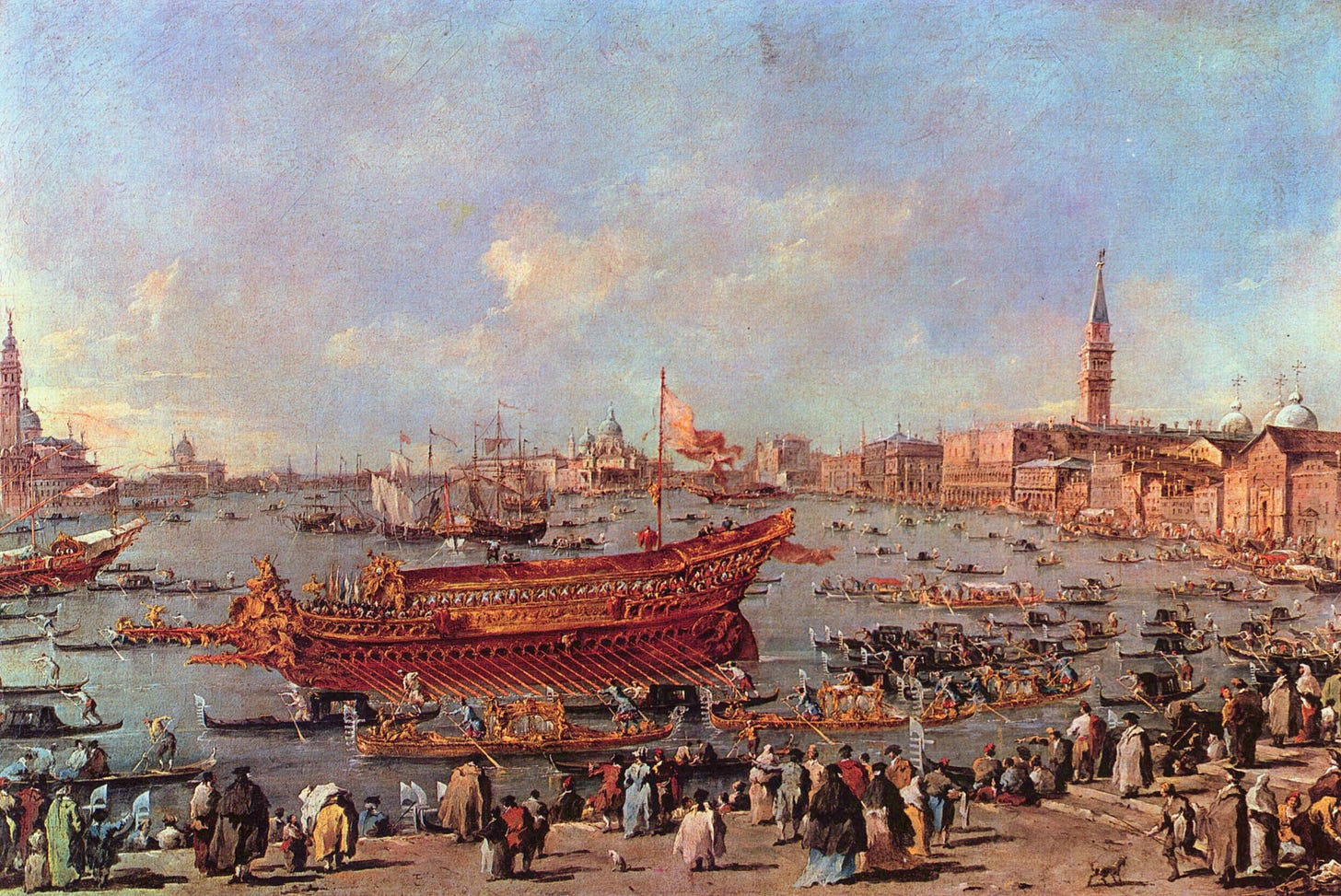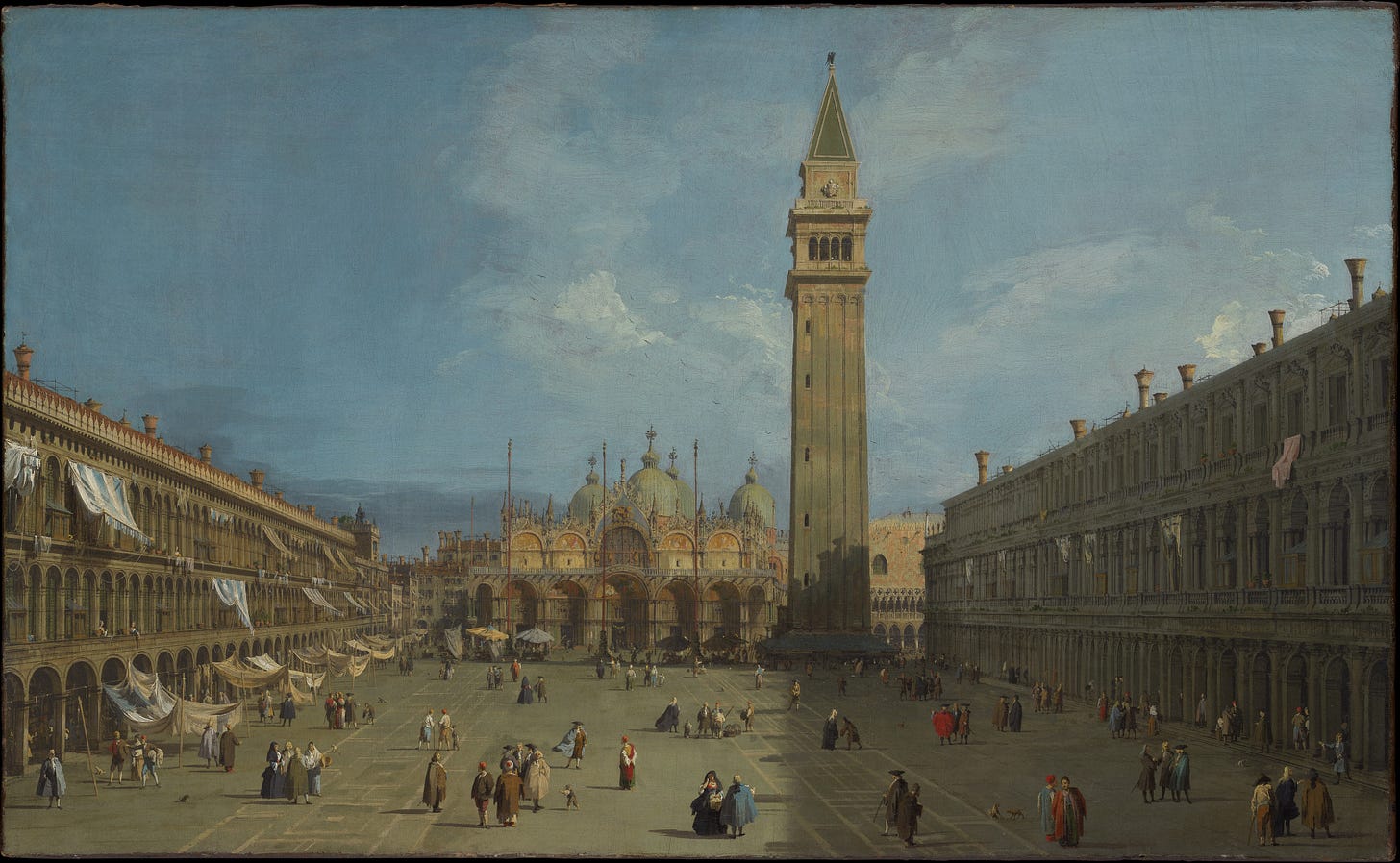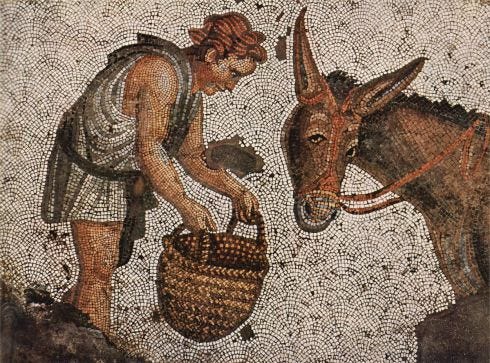This short story has been kicking around my head for nearly a decade, just waiting to be written. However, it ended up not being very short, so I’ll be releasing it in three parts. This is Part 1.
For those of you who prefer to read off paper rather than the screen, I have converted this entry into an easily printable pdf file:
Nine black ribbons fell from the sky, drifting like a murmuration. They fell through the patch of grey directly above Niccólo as he crossed the square in front of the ducal palace. The ribbons had been falling all morning. Every time he raised his eyes to the sky they were there, rippling in the wind, inky strips of silk that never reached the ground. Last week it was nine black crows lined up on the eaves of every rooftop he glanced at. And a few months ago it was the nine rats in his cellar and the nine black fish he spotted swimming beneath the Rialto. Whatever omen this was, it was drawing his gaze from the depths to the heavens.
He had told no one of these signs, knowing how they would be interpreted by the superstitious gossips of the Serene Republic. And merchants like Niccólo gained no profit from speculative rumour about their standing with the divine. He was trusted for his pragmatic, worldly wisdom and his wearisome consistency. Not for his flights of fancy. And though the number nine was not exactly unlucky, it was not clearly fortuitous either. So Niccólo ignored the ribbons which were now suspended in the air above the dome of St Mark’s and hurried toward the Port Master’s palazzo, reminding himself to avoid looking at the sky for the rest of the day.
He did not need to be at the Port Master’s so early, but Niccólo liked to be the first among the mercantile class to view the manifestos of the vessels which had docked at the city overnight. He felt it put him ahead of his competition, and like everything else in Niccólo’s life, it became a routine. The slow reading of the inked parchments by the thin morning light, the probing questions asked of the Port Master to glean the most interesting details, the mental notes made about departing ports and ship tonnage and ratios of export to import. It soothed him, much like his afternoons spent applying his abacus and slide rule to his accounts. To be in Venice was to be in the centre of the world’s greatest web of information, and to carefully sift through that information was to avoid becoming tangled in the threads.
The old woman found him as soon as he had crossed into the courtyard. She came hobbling across the cobblestones, dark eyes unblinking above her proud nose. She was diminutive, childlike, which only made her seem older. She often accosted Niccólo when he visited the Port Master, pushing her veiny hands out of her muddy sleeves to grab onto him. Many of the fine homes housed beggars in their outer perimeters, but none dared to touch a wealthy merchant. However, Niccólo could not find it within himself to treat the old woman too harshly, despite her repugnancy. In truth, he feared her. Not for her state of uncleanliness, but because she seemed to know about the omens that haunted him.
“Niccólo Polo, the man who is afraid of the sky!” she croaked, peering up at his stern face as she sunk her fingers into his fur-lined cloak.
He tried to brush her off, but she had a deceptively strong grip. “I have no coin for you today,” he said in a low voice. “Go bother someone else.”
The woman grinned, revealing gums and black stumps. “You speak as if you owned your wealth, young man. But it owns you. If a coin wishes to come to me, you have no choice but to obey.”
She held up a bony claw and Niccólo saw the flash of a silver grosso before it disappeared into her tunic. The woman could move quickly when she wanted to.
“I must go to the Port Master,” he said with mustered formality. “You should find someone else to blather to.”
He removed himself from the woman’s grip and took a long stride forward, but found she was in his path again, lifting a crooked finger to his chin.
“Remember that you are more than the Port Master’s servant. He has barely even woken and you come panting like a dog for scraps. How long will you hide from your own life?”
Niccólo blinked twice like a stunned fish, before drawing himself up to his full height and pushing past her.
“Heed my words, Niccólo!” she called after him, her voice ugly in the quiet of the courtyard. “Your nephew awaits you within these walls. He is your final omen. You cannot ignore the calling.”


Niccólo put the crone out of his mind as he stepped through the colonnades toward the embossed doors. The woman often raved at him like this, spouting nonsense and vagaries. She was almost certainly a gypsy, one of those mendicant witches who floated their way into Venice’s dirty canals on rat-infested barges and eked out a living from alms-begging and fortune-telling and other forms of nuisance. Besides, Niccólo had nine nephews, all of them engaged in the family business. So it was entirely possible, or even probable, that one of them was at the Port Master’s offices.
He rang the brass bell and was shown to the sitting room with the picture windows and steaming brazier which kept the room warm despite the chill of the autumn morning. He sat in his usual position, wrapping his cloak around his thin frame like a bat folding leathery wings, and watched the doorway where the Port Master would enter from his private quarters. Except it was not the heavy frame of the Port Master who walked through the archway, nor was it his effete, snivelling secretary. Instead a dishevelled youth trod barefoot across the stone floor, his stench reaching Niccólo before anything else. His eyes burned blue and feverish in his emaciated skull, glaring out through matted bangs of dark hair.
“Uncle,” the youth rasped, reaching out a hand, and Niccólo found himself recoiling. It was Marco, his sister’s second-eldest son, who nobody had seen for years. He had disappeared into the barbarian provinces to the east.
Niccólo slowly rose and grasped Marco, overcoming his revulsion. “Nephew, what has happened to you?”
Marco very nearly collapsed into his arms and began sobbing. Niccólo gently guided him into one of the armchairs and knelt at his feet, keeping hold of his arm. It scarcely seemed possible that this wretch was Marco, the young hooligan who Niccólo had always loved but had never been able to entrust with any serious tasks. The boy lacked Stefan’s head for numbers and Pietro’s calm demeanour. He was too much of a dreamer, always mooning after young women of the Venetian nobility or composing poetry about the Holy Land. The last time Niccólo had seen Marco was in Byzantium, when his nephew showed him some exquisitely soft fabrics and insisted he could acquire more of them from a contact he had made in the east. Niccólo did not discourage him, but nor had he paid him much heed. He gave Marco a purse of silver for the fabrics, told him to bring at least quadruple in the next shipment, and issued the usual lecture about prudence and upholding the family name and avoiding drink and loose women.
The last he had heard was that Marco was in Baghdad, having made friends with an Arabic trader who knew the road from the Holy Land to the Caliphate. But that was three years ago, and the entire Polo clan assumed Marco had been killed, taken prisoner, or fallen ill. Such were the risks of mercantile life.
“They are putting me in prison,” Marco smiled, and Niccólo could see gaps where his teeth had fallen out. He wondered if anything had been knocked loose in the boy’s mind, for who would be happy about being sent to prison?
“They say I have been spying for the Genoese,” Marco whispered, answering Niccólo’s unspoken question. “But at least I can finally rest. And if you send me quills and parchment, uncle, I can write down all that I have seen.” The thought of writing seemed to excite Marco, and he almost sprang from the chair despite his weakened state.
Niccólo restrained him and frowned. “Have you been spying?”
Marco waved a filthy hand through the air, dismissing the basis of the question more than the question itself. He leaned close to Niccólo and gave him a strange look.
“Quick, uncle, let me deliver the message I was tasked with. For the Port Master is coming soon and he will have no choice but to hand me to the jailer.”
“What message? From who?”
Marco moved his mouth to his uncle’s ear and Niccólo did his best not to inhale Marco’s salty stench. He had clearly spent time in the hold of some small ship; his body carried the smell of rat droppings and urine and damp seaweed.
“The Oracle of the East calls you, Niccólo.” Marco’s voice had suddenly changed, from the rasping whine of an adolescent boy to a deep and solemn timbre, like a holy man uttering a prophecy.
“The living Wisdom, possessing knowledge passed down from the beginning of the world, has selected you to be raised up.”
Niccólo did not know how to respond.
“You have nine days to leave the Serene Republic and travel to Byzantium. In the Golden City you will be met by the servant of the Oracle who will guide you.”
“And then?” Niccólo’s voice shook and he felt a flash of embarrassment.
“You will travel over land and sea until you find the shrine of the Wisdom. And then you will be raised up, as the Oracle has decreed.”
“Why should I go? Who says I need to meet an oracle?”
The voice that was inside Marco seemed to pause, like it was drawing a deep, indignant breath. “If you do not meet with the Wise One, you will be haunted for all the days of your life. You will be hounded by the knowledge of your own cowardice. It will prod you at every turn, like spikes at a crossroad; falling into your eyes like dust each time you lift your gaze, and pricking your skin whenever you kneel to receive the sacraments.”
Niccólo spluttered. “But that is no choice at all!
“Ah, but it is,” said the voice through Marco’s limp mouth. “You can choose the risk of seeking or the punishment of comfort. Both will be painful in their own way. You have been called, and there is no other way.”
There was a shuddering sound and then Marco pulled away from Niccólo, his face holding a confused, questioning look. Then he hauled his body out of the chair and limped back toward the entrance. The heavy footfalls of the Port Master were pounding down the corridor.
“Don’t forget about the quills and parchment, uncle,” Marco said in his usual voice. “I have so many tales to record, and I fear they will leave me before I get the chance to recall them.”
Niccólo sat dumbly by the window and watched as the Port Master’s guards clapped chains on his nephew and led him away, no doubt to be rowed over to the prison colony on a neighbouring island.
The words which had come through Marco sat heavily on his lap, like a cat purring to itself after a successful hunt. Nine days, Marco had said, nine days to get to Byzantium and meet the guide who would bring him to this Oracle. It all seemed ridiculously fanciful, and if it were not for the change in Marco’s voice and the number nine, he would have dismissed the whole thing. But when he glanced out the window at the grey sky, he saw the ribbons falling and he knew he could ignore them no longer. He left the Port Master’s palazzo without looking at the manifests and walked hurriedly to the basilica. If he was going to sail, he needed to confess and then receive the priest’s blessing.
It was noon by the time Niccólo left the Hagia Sophia, the heavy bells setting his teeth on edge as they clanged. And it seemed beyond belief that it was exactly nine days since he had walked out of St Mark’s to prepare for the journey. He looked up at the heavenly dome of the Church of Holy Wisdom and wondered at his swift travels. The voyage from Venice to Byzantium should have taken more than a fortnight, but the winds had been unusually favourable, like they had been sent to scoop Niccólo’s vessel into Byzantium’s harbour.
He told no one of his reason for travel, not even his housekeeper, and the only clue of his whereabouts that his family would receive was contained in a sealed letter left with his banker, with strict instructions to be opened in a year’s time. The business could run itself between now and then; most of the contracts had already been signed and the year’s loans would easily be repaid. Most likely, he would return to Venice in time to retrieve the letter and burn it before it was read, and nobody would know of this foolish endeavour. But if he did not resurface by the feast of St Francis, the sealed letter gave full control of the business to Stefan and Pietro, with a small share for his sister and a lifetime allowance for his housekeeper.
It was freeing, Niccólo reflected, to be able to deal with all your dependents in one letter. He felt proud of his narrowed existence and the simple way he lived, with no direct bloodline to fret about, devoted to trade like it was a deity to be worshipped. He shook this last blasphemous thought from his mind and passed his gaze around the heaving crowds of the forum. When would this guide make himself known?
He wandered over to a stall selling hot food and pushed his way to the front of the line to hand over a coin. As he made his way toward the edge of the square where there was shade from the noonday sun, he sensed he was being followed. He glanced around and saw that a donkey was nosing after him, no doubt smelling the warm bread in his hand. He flicked his hand to shoo away the ass and looked around for the owner, but the animal kept clopping toward him.
“Begone!” Niccólo spat at the donkey, lifting the bread away from the beast’s mouth.
“There is no need for that,” the donkey said drily, flicking its ears as it spoke. “I already ate.”
The voice coming from the donkey’s mouth was somehow in the same low tone that Marco had spoken at the Port Master’s palazzo. Niccólo felt his legs give way and he fell to the ground, jarring his tailbone on the hard blocks of stone.
“Be not afeared,” the donkey said, turning a large dewy eye onto Niccólo. “I will not always speak to you like this. But I needed to get your attention.”
“Are you the Oracle?” Niccólo ventured, the words coming out strangled. How could he be conversing with a beast of burden?
The donkey blinked at him, long lashes grazing its soft cheeks. “Pack only what you need and meet me back at this place before the clock strikes nine. I will bear your burden and show you the way.”
With those words the donkey snorted and stamped its hooves and wandered down one of the narrow lanes which led from the square into the crowded metropolis. Niccólo remained on the ground for some time, trying to work out if the strong incense from the church service had induced hallucinations or if he was simply going mad.
(to be continued…)









Well-done! As a fan of monte cristo, I loved the Italian setting.
😃 can't wait for the second part.